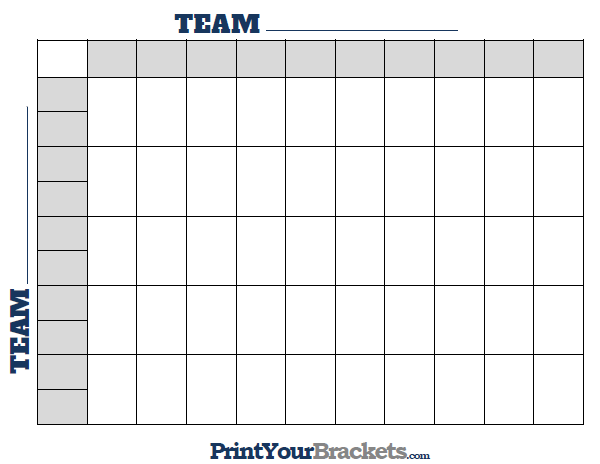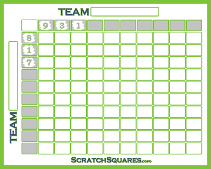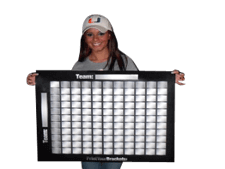|
How does this vary from the normal Super Bowl Squares?
Everything is exactly the same but you have some different options on how to run this one.
These squares can also be used for any basketball game of the season.
Option 1
You can set this up for the NBA Finals Championship game, but the twist here is you don't know which game number that will be. If a team has a 3-0 series lead then game four could be the last game, this causes the players who are winning the squares in the first 3 quarters of the game to root for the series to be over, but the players who have not won any squares will be rooting for the series to continue.
Option 2
This option is for the NBA Finals series, instead of paying out by each quarter, the winners will be decided by the final score of each game. But the twist here is the payouts will be determined once the series is over in accordance to how many games are played(4 games each winner gets 1/4 of the prize pool, 5 games each winner gets 1/5 ect...).
How does this vary from the normal 100 Square Grid?
Everything is the same but each square will now have two numbers in the left hand column, which gives each square two chances to match the team listed on the left side.
Step 1
Print the square grid from above and place one of the teams on the top blank line and the other team on the side blank line. It doesn't matter which team goes where.
Step 2
Sell each square for a set dollar amount until all squares are full, a player may buy as many squares as they wish. Once the player pays for the squares they are to write their name in the squares of their choice. If you feel 50 squares is too few or too many check out our 25 square grid or 100 square grid.
Step 3
Once all the squares are full it is time to set up the drawing. This can be done in many ways, listed below are 2 examples. After determining the drawing method, draw the numbers one at a time placing the numbers from left to right starting with the first gray square box in the top row, continue across the top row until the numbers are gone. After that is complete you will redraw the numbers, this time placing the drawn numbers in the gray square boxes in the left column, starting at the top.
Example 1: Write the numbers 0-9 on pieces of paper and place them in a hat.
Example 2: Get a deck of cards A through 10, the ace represents a one, the 10 represents a 0, 2-9 are face value.
Step 4
Now is time for the fun!! Begin watching the game, at the end of each quarter/game match the last digit of each teams score with the grid.
Example: At the end of the first quarter the team on the top line has 17 and the team listed in the left column has 14. Go to the top row of numbers and find the number 7(last digit of 17) then go to the left column of numbers and find the number 4(last digit of 14) find where these two numbers intersect on the grid and the name in that square wins the first quarter. If using option 2 from above you will be using the numbers from the end of each game.
Payout's
If you are using option 1 from above, the most common method is to give the winner of each quarter 25% of the prize pool. It is possible that a player can win all four quarters and the whole prize pool. Be sure to discuss what is going to be done in case of an overtime, some people will just ignore the overtime score, some people will substitute the overtime score for the 4th quarter, and others will then divide the prize pool by 20%.
If using option 2 from above the number of winners will be decided at end of the series. If the series lasts four games the prize pool will be divided by 1/4, 5 games the prize pool will be divided by 1/5, 6 games the prize pool will be divided by 1/6, 7 games the prize pool will be divided by 1/7. When using this option most people go by the final score of the game including any overtimes, but you could use the score at the end of the fourth quarter, it is your choice. To avoid problems make sure all of this is discussed before selling the squares.
| 




